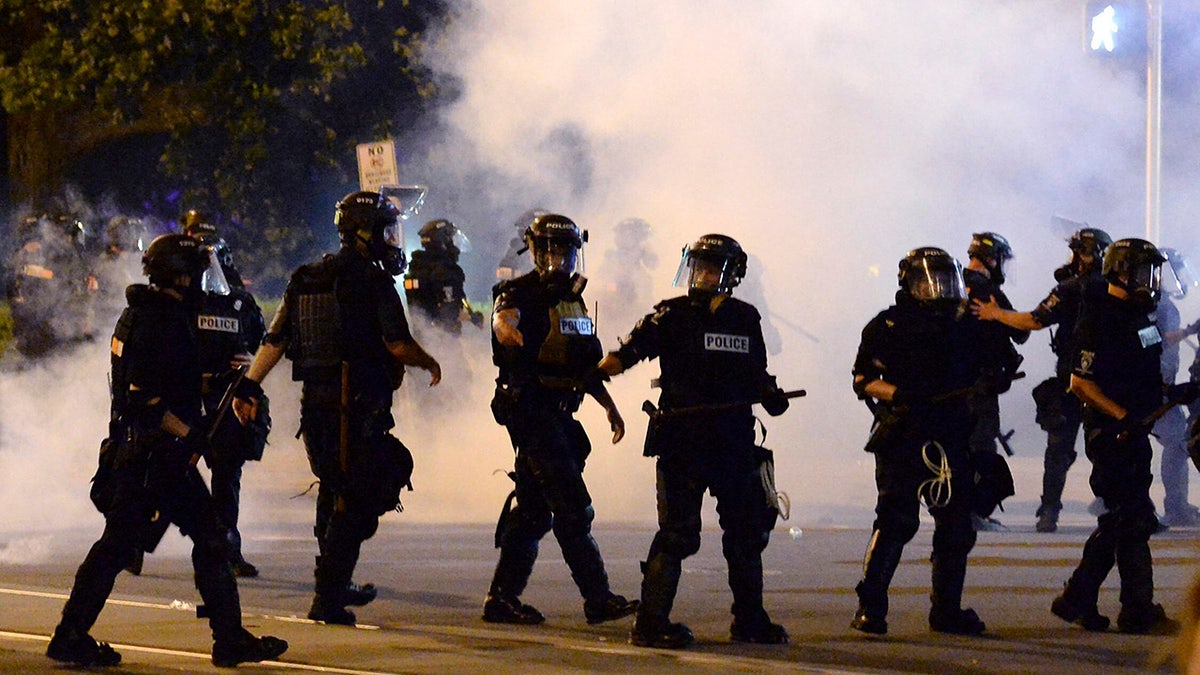Growing push to defund or dismantle police departments in big cities across America
Chief congressional correspondent Mike Emanuel has an update on how city leaders and lawmakers on Capitol Hill are reacting.
North Carolina’s largest city has blocked its police department from purchasing chemical agents, like tear gas, normally used in crowd control or dispersal, in the next fiscal year.
The move is part of several reforms approved by the Charlotte City Council Monday night.
The motion introduced by Councilman Braxton Winston to eliminate the portion of Charlotte-Mecklenburg Police Department’s budget designated for chemical weapons passed along a 9-2 vote.
“The people of Charlotte will be pushing forward with new models to keep our community safe,” Winston told the Charlotte News & Observer. “We are not looking backwards. Our eye is on the horizon.”
The police department spent $103,000 on chemical agents last year, Charlotte Budget Director Ryan Bergman told WBTV. The only two Republicans on the Charlotte City Council, Tariq Bokhari and Ed Driggs, were also the only two to vote against the motion.
It does not prevent Charlotte officers from using tear gas on the ongoing protests related to the death of George Floyd, an unarmed black man who died in police custody on May 25 after a white Minneapolis officer knelt on his neck for nearly nine minutes.
Since Floyd's death, Black Lives Matter has called to #AbolishPolice or #DefundPolice. Officials in Minneapolis, New York City and Los Angeles, as well as congressional Democrats, have vowed to defund police departments and instead allocate funds toward social services and underserved communities.

Charlotte-Mecklenburg Police Department officers begin to move forward through tear gas during a protest, Saturday, May 30, 2020, in Charlotte, N.C., as people nationwide protested the Memorial Day death of George Floyd, who died in police custody in Minneapolis. (Jeff Siner/The Charlotte Observer via AP)
The Charlotte City Council vote also comes after the Charlotte Mecklenburg Police Department faced criticism for deploying tear gas on peaceful protesters on June 2. Video recorded by Queen City Nerve, an alternative newspaper, showed protesters marching in the street when police deployed the chemical agent. When they turned to run, the crowd was met with officers on the other side, and it appeared tear gas was used from both directions.
Charlotte Mayor Vi Lyles condemned the incident as “one of those times that none of us can be proud of,” while CMPD Chief Kerr Putney described the video as “disturbing.”
DISTRAUGHT CHICAGO OFFICIALS HEARD ON TAPE FUMING OVER LOOTING, RIOTS: 'MY WARD IS A S--T SHOW'
“Last night was one of those times that none of us can be proud of — that none of us would want to see happen in our city,” Lyles said. “But it did. And I hope everyone is aware that that’s not the kind of department we want to have for policing. It’s not the kind of reputation that we want to have nationally or locally. So when you look at that, we have to understand we can be better than that.”
Winston, who was arrested on May 29 for allegedly failing to disperse, said that the city council’s “step alone is not good enough” to solve systemic problems within Charlotte’s police department and address other racial injustice in the United States.
“For the allies, please know that we need you to keep the same energy tomorrow morning that you have displayed over the past few weeks,” he said Monday. The motion also tasked the city council with developing a committee to oversee how the police department spends its money and develops policy.
CLICK HERE TO GET THE FOX NEWS APP
More than 730 people and 28 local groups signed a list of demands put together by the Charlotte for Black Futures coalition encouraging the Charlotte City Council to also reallocate five percent of the Charlotte-Mecklenburg Police Department’s budget toward affordable housing, transportation and community health programs, and develop a task force on reparations for black residents in Charlotte.










































